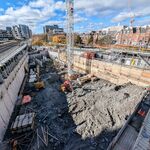Copy from
http://danielscondo.blogspot.com/
Daniel's Midtown Corporation owns Daniel's Home Management
Many of the problems with newly built condominiums would rise up over the next couple of years. Stripping walls that had water pouring down on the inside and mould on the bottom, and replacing cold walls because they didn't put insulation in the walls, vapour barriers that were two-ply instead of six-ply or not even attached and sealed off properly, doors that didn't close properly -- the list is endless.
Unsafe conditions in a condo -- you can talk about air quality, etc. A good example of that, of course, is what we are going through now where DMC (Daniels Midtown Corporation) has installed a ventilation system into our buildings that is not capable of vent that size of space.
However, most people do agree that "buyer beware" is not an adequate response to the problems, particularly when some potentially troublesome construction deficiencies are not readily apparent, even to the trained eye.
A technical audit is a review and comment on the present and anticipated condition and performance of a building’s various elements and systems. This report is also known as a structural audit, building condition audit, or asset condition report. Various elements of the development can be included in the review (architectural, mechanical, electrical, civil, elevating devices, building envelopes, underground parking structures, recreational facilities and other specialty construction).
But really the bottom line there is when the work was done in the first place, it wasn’t inspected to ensure compliance with the National Building Code.
If you look at the building safety codes and the National Building Code, there are building codes that regulate the construction done under building permits. This is both for health and safety, structural stability, and structural sufficiency.
Even with building code compliance, much of the building code, if you read it, doesn't say that this is the absolute be-all and end-all. It doesn't say that this is the best you can do. It says this is what the minimum is.
The technical audit done for a new condominium (including our buildings) shows an average of 250-300 building code violation. Translation: this building was built at a lower standard than the minimum requirements. Yes, you have paid for a luxury condominium and what you got is a run-of-the-mill condominium.
Now, whether it's in carpentry, plumbing, electrical or mechanical systems, sloppy work is happening out there. It's not just in the obvious stuff that you see. It's with vapour barriers and insulation.
Many of the situations we're facing now are because of shoddy workmanship.
This is the reason, that studies have shown now that the first major renovation in new condominiums being built today is 10 years.
I mean no disrespect to DMC, and I'm not implying that anything is unethical. They're fairly savvy. They know what they're doing. They're going to be better at the negotiation; they're going to be better at handling what happens in terms of TARION warranties.
In our case, the developer (DMC) owns the property management company (DHM). If there is an inspection process done within that warranty program, who is going to look at it? Make sure that whoever is going to do that inspection is competent to do it and is going to understand what they're really evaluating. Most experts do agree, however, that the problems experienced by recent home purchasers are due to flaws in design and/or construction rather than the lack of maintenance.
Over time, maintenance does play an increasing role in ensuring the integrity of our condominium. There is ample evidence that early detection and correction of problems can help prevent more costly damage from occurring. We should encourage early detection and recognize the growing importance of maintenance.
It is not a time to be emotional. And it can be a really nasty surprise, I think, to a lot of people when you assume that the person you're working with represents you, and you find out that they actually represent the developer. They don't represent you. That's not a criticism; that's the reality. But, in general, remember that this person isn't working in your best interest.
After one year and 3 months in servicing our condo, DHM is still to establish and maintain quality building maintenance program.
DHM is still to schedule regular visits of the building to inspect the premises, make sure everything is clean and maintained.
DHM is still to enforce the rules and regulations. Many procedures and rules exist in the Condominium Documents that were provided to each purchaser, but they have not been implemented or enforced.
DHM is still to negotiate volume discounts and national contracts with supplier. Wait a minute, there is no volume, they are only managing a couple projects..........
DHM is being in business for only two years, needs to build up reputation and experience that other condo management companies easily can provide, today.
You want to know that the risks are identified; you want to know that those risks are going to be properly managed and managed appropriately.
Hire a reputable property management company to rectify the numerous building and operating problems that had been identified during the Performance Audit.
Thank you Kate. That's a good article.




